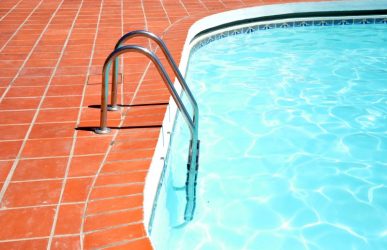The water quality of swimming pools
Your above ground pool’s safety does not begin at the water’s edge. Properly maintaining a pool’s chemistry is critical to providing a safe and pleasurable experience.
We’ve all been to a pool where the water strongly smells of chlorine and our eyes were burning and red after going into the water. Many think that this occurs when there is too much chlorine in the water. Ironically, when it comes to above ground pool chemistry, just the opposite is true – there is not enough chlorine in the pool water when it smells strongly of chlorine.
A smelly above ground pool indicates the presence of excess chloramine. Chloramine is produced when there is not sufficient chlorine present in the water to oxidize sweat, body oil, urine and perfumes introduced to the water by swimmers.
“Free” chlorine is what kills bacteria and germs in pool water along with oxidizing natural ammonia waste products from humans – the sweat, body oil and urine. If there is not enough chlorine in the pool, the chlorine actually bonds to the ammonia creating chloramine.
Once enough of the free chlorine bonds with the ammonia waste products to create chloramine, the pool water begins to smell of chlorine and can cause skin irritation.
To prevent chloramine from forming in the first place, above ground pool owners need to maintain a pool chemistry with the proper balance of free available chlorine (FAC) and combined available chlorine (CAC) (the chlorine being used in the chloramine compounds). The amount of combined chlorine, the stuff we have to watch out for, can be calculated once you test for free chlorine and total chlorine.
combined chlorine = total chlorine – free chlorine
Combined chlorine should never exceed 50% of the free chlorine value and ideally should be kept less than 0.2 parts per million.
If your pool water smells of chlorine caused by excess chloramine, you will need to use a “shock treatment” to help destroy the excess ammonia and chloramine compounds. To destroy the chloramine and get the pool chemistry back to where it should be through shock treatment or superchlorination, the amount of free chlorine needs to be about 10
times the combined chlorine.
Don’t forget that above ground pools that are in direct sun may lose more of their free chlorine on particularly warm days and may allow for greater chloramine formation.
It is often said the best offense is a good defense. If you know ahead of time that your pool will see a large increase in use due to a scheduled event, you should take preventative action by shocking the pool prior to their arrival.
Additionally, vacuum and brush your above ground pool daily to remove the dirt chlorine reacts with that hasn’t been removed by the filters.
Indoor pools, pools used for competition, and pools with heavy usage are more likely to have problems with chloramine and the noxious chlorine smell that comes with high amounts of chloramine in pool water. The American Chemistry Council published an article by Tom Griffifths (Dir. Of Aquatics for Penn State University) where he states his belief that the “ideal” ranges for chlorine in public swimming pools is “simply too low and just plain wrong.” He recommends that heavily used pools should maintain 3.0 – 4.0 parts per million of chlorine in order to prevent chloramines.
Properly maintained pool chemistry may not be the best way to deal with pool odor. By enforcing a strict policy that all bathers must shower (preferably a full soap-shower) prior to entering your above ground pool, you can eliminate much of the problem before it starts. There are some who believe if everyone showered before entering pools, the need for chlorine would be reduced by 50%. Explain to your swimmers and bathers that the more they shower off their naturally occurring body oils, the less chlorine will need to be added to the pool. By making toilet facilities more accessible, you will also make the pool, uhm, less convenient.
By maintaining the proper pool chemistry and keeping chloramine to a minimum, you make your above ground pool more attractive and safer for your friends and family. They’ll thank you for it – after all, red and irritated eyes have never made for much of a fashion statement.



